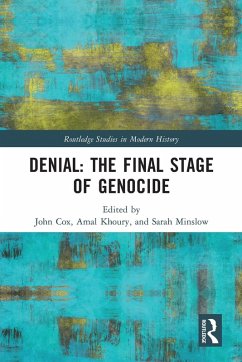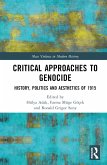Genocide denial not only abuses history and insults the victims but paves the way for future atrocities. Yet few, if any, books have offered a comparative overview and analysis of this problem. Denial: The Final Stage of Genocide? is a resource for understanding and countering denial.
Denial spans a broad geographic and thematic range in its explorations of varied forms of denial-which is embedded in each stage of genocide.
Ranging far beyond the most well-known cases of denial, this book offers original, pathbreaking arguments and contributions regarding:
competition over commemoration and public memory in Ukraine and elsewhere
transitional justice in post-conflict societies;
global violence against transgender people, which genocide scholars have not adequately confronted;
music as a means to recapture history and combat denial;
public education's role in erasing Indigenous history and promoting settler-colonial ideology in the United States;
"triumphalism" as a new variant of denial following the Bosnian Genocide;
denial vis-à-vis Rwanda and neighboring Congo (DRC).
With contributions from leading genocide experts as well as emerging scholars, this book will be of interest to scholars and students of history, genocide studies, anthropology, political science, international law, gender studies, and human rights.
Denial spans a broad geographic and thematic range in its explorations of varied forms of denial-which is embedded in each stage of genocide.
Ranging far beyond the most well-known cases of denial, this book offers original, pathbreaking arguments and contributions regarding:
competition over commemoration and public memory in Ukraine and elsewhere
transitional justice in post-conflict societies;
global violence against transgender people, which genocide scholars have not adequately confronted;
music as a means to recapture history and combat denial;
public education's role in erasing Indigenous history and promoting settler-colonial ideology in the United States;
"triumphalism" as a new variant of denial following the Bosnian Genocide;
denial vis-à-vis Rwanda and neighboring Congo (DRC).
With contributions from leading genocide experts as well as emerging scholars, this book will be of interest to scholars and students of history, genocide studies, anthropology, political science, international law, gender studies, and human rights.









